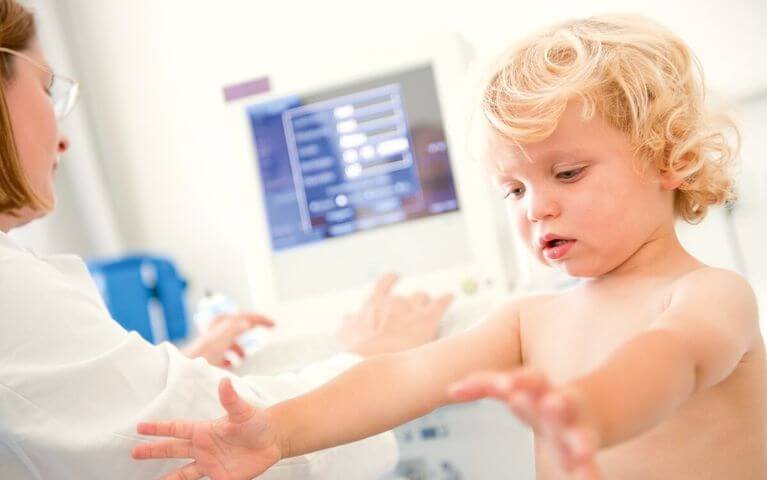Metabolism Center
at the Center for Child and Adolescent Medicine
For over 40 years, our department has specialized in the diagnosis and treatment of inherited metabolic diseases. Our team, consisting of physicians specialized in pediatric metabolic diseases, specially trained nursing staff, dieticians, psychologists, and (bio-)chemists, treats more than 500 patients with all types of congenital metabolic diseases every year.
Congenital metabolic disorders if not detected can lead to organ damage, physical or mental disability, and even death. The symptoms are varied and often not specific: They range from serious crises after birth with loss of consciousness, seizures, respiratory disorders, or organ failure, to physical and mental developmental disorders. Many of these diseases are treatable today, especially if they are diagnosed early enough.
We treat patients suffering from
- Disorders of amino acid metabolism (e.g., phenylketonuria, maple syrup urine disease, tyrosinemia type I)
- Urea cycle disorders
- Organic acidemias (e.g., glutaric acidemia type I, methylmalonic acidemia, propionic acidemia)
- Carbohydrate metabolism disorders (glycogenosis, galactosemia, hereditary fructose intolerance)
- Fatty acid oxidation and carnitine cycle defects (e.g., MCAD, VLCAD, and LCHAD deficiency)
- Respiratory chain defects and other energy metabolism defects
- Cholesterol biosynthesis defects (e.g., Smith-Lemli-Opitz syndrome)
- Creatine biosynthesis defects
- Neurotransmitter defects
- Purine/pyrimidine metabolism disorders
- Lysosomal storage diseases
- Peroxisomal metabolic diseases
- Protein glycosylation defects (so-called CDG syndromes)
- and disorders of vitamin synthesis and transport
With our cutting-edge technical equipment and our many years of experience in clinical treatment, we are able to conduct targeted diagnostic procedures
We have two laboratories in which we regularly use special biochemical methods that you will find in very few hospitals in the world.
Newborn Screening laboratory
In the newborn screening laboratory, we examine blood samples from more than 140,000 newborns from Germany and abroad every year for congenital metabolic diseases, hormone disorders, cystic fibrosis and disorders of the immune system. Early diagnosis allows us to initiate specific treatment as soon as possible after birth and thus prevent disability and deaths.
Specialized metabolic laboratory
In the specialized metabolic laboratory, we run comprehensive diagnostic tests for patients with a suspected diagnosis of an inherited metabolic disorder. Numerous diseases can also be diagnosed that are not covered in the newborn screening. In addition, a broad spectrum of confirmatory tests are available for individuals in whom an inherited metabolic disorders was suspected by newborn screening.
Interpretation of results in a experienced multidisciplinary team
The laboratories are in a unique interdisciplinary setting enabling assessment and interpretation of the results in a team of experienced analytical (bio-)chemists and paediatric metabolic specialists. This leads to recommendations for further testing, initiation of the specific treatment, and long-term follow-up and therapy monitoring.
Parents can be accommodated on the metabolic ward in the patient’s room or in a parent room. There are also a number of private accommodations available in the vicinity.
Contact
You can contact us via the International Office or directly at the hospital director’s office (Tel. +49-6221-56 4100 or Email: georg.hoffmann(at)med.uni-heidelberg.de). Our emergency hotline at +49-6221-56 4002 / 4003 is always available in cases of acute metabolic imbalance.
-

With our cutting-edge technical equipment and our many years of experience in clinical treatment, we are able to conduct targeted diagnostic procedures.
Overview: All Clinical Departments at Heidelberg University Hospital
Overview of Departments: Childhood Diseases:



